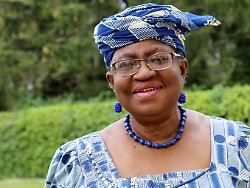Monday, February 15, 2021
WTO gets a female boss for the first time
Okonjo-Iweala needs to push reforms
She brings international experience and specialist knowledge to the table: The new WTO boss Okonjo-Iweala is hoping to give the blocked organization a boost. This includes, above all, a reform of dispute settlement.
After the end of a month-long US blockade, the Nigerian development economist Ngozi Okonjo-Iweala has been appointed as the new Director General of the World Trade Organization (WTO). The decision of the 164 member states was unanimous at an online meeting of the WTO ambassadors in Geneva. The 66-year-old will take up office on March 1st.
With Okonjo-Iweala, a woman and for the first time a representative of the African continent will head the organization founded in 1995. The WTO wants to promote the liberalization of world trade under fair and sustainable conditions. According to Okonjo-Iweala, trade is an engine for prosperity, resilience and sustainable growth.
"I look forward to implementing measures with the member countries to get the global economy going again," said Okonjo-Iweala after the appointment. "Our organization faces many challenges, but if we work together we can make the WTO stronger and more agile together and better adapt it to current realities." The USA was the only country to refuse approval to the 66-year-old under ex-President Donald Trump in the fall. Trump's successor Joe Biden lifted the resistance.
Okonjo-Iweala has extensive international experience: she was twice finance minister of Nigeria and for 25 years at the World Bank in Washington, where she rose to number two. Most recently, she headed the board of directors of the international vaccination initiative GAVI, which is supposed to coordinate the fair distribution of corona vaccines worldwide. She succeeds Roberto Azevêdo, who retired early in the summer of 2020. He switched to the US beverage manufacturer Pepsico.
US blocks dispute settlement
Okonjo-Iweala takes over the WTO in its worst crisis. There has been no major trade liberalization since the failure of the Doha Round that began in 2001. One of the greatest achievements of the WTO, the settlement of trade disputes, has been paralyzed because the US has been blocking the appointment of new appellate judges for years. The appellate body has therefore been unable to act since December 2019. The criticism of the handling of the appellate judges began under President Barack Obama. The US is demanding reforms, but has made few concrete demands.
Other countries also see a need for reform. In order to mediate in the difficult situation, political skills are required, said the head of the Ifo Center for Foreign Trade, Lisandra Flach. Ms. Okonjo-Iweala brings this central quality with her. Wolfgang Niedermark, member of the executive board of the Federation of German Industries, described the decision as a "liberation for urgently needed reforms and a sign of hope for international rule-based trade". He called on the economist to take courageous steps. "The top priority for Ngozi Okonjo-Iweala must be the reform of dispute settlement. Only a reformed WTO mechanism can resolve trade disputes using clear and binding procedures."
. (tagsToTranslate) economy (t) WTO (t) trade relations (t) trade conflicts (t) world economy (t) free trade agreements
